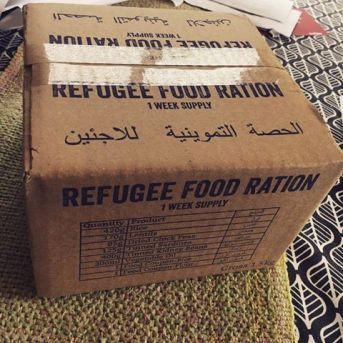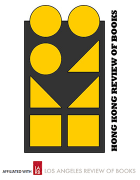Luke Cripps lives for a week on the contents of a Refugee Food Ration box and critically reflects on the experience and the cultures of fundraising that encourage us to undertake such strange acts.
 420gm Rice
420gm Rice
85gm Dried Chickpeas
400gm Kidney Beans
300ml Vegetable Oil
170gm Lentils
125gm Sardines
1 Flour Coupon
1 Rice Coupon
An Australian organization, Act for Peace, runs a fundraiser each year where they send participants a Syrian refugee ration pack and ask that they live for seven days on the contents. The rules are simple: you’re allowed to consume the contents however you please, plus as much water as you feel inclined to drink, for seven days, and nothing else. No alcohol, no coffee, no tea. As an incentive to raise additional funds, there are some targets you can hit to ‘buy’ yourself other ingredients (such as salt, or herbs and spices). So for seven days, from the morning of the 19th of July to the morning of the 26th of July, I drank only water, and consumed only what you would find in one of these ration packs.
These packs contain a variety of foodstuffs; occasionally, if a non-government aid organization is working in the camp you find yourself in, you might find a coupon for some additional rice or flour. I was interested in the ‘fundamental’ experience of living on rations, and elected not to use any coupons for additional ingredients. These ingredients comprise a total of around 5000 calories, which is enough to keep you alive and constantly hungry. This style of fundraising seems to be growing in popularity, and deserves a comprehensive and in-depth analysis. However, such a comprehensive analysis of this rise in popularity far outstrips the aim or scope of this piece. In what follows, though, I hope to open up a space for beginning to think through some of this.
I
I can’t deny there was something attractive about this ‘ration challenge’ as an exercise shot-through with punishing difficulty. By day four of the experience, I was seeing signs of degradation in my cognitive abilities, as well as my physical capacities. I was struggling to concentrate, and by late-afternoon, struggling to even stay awake. I felt easily exhausted by walking even short distances. I constantly had the dull ache of hunger, the splitting headache from no caffeine, and the oddly bloated feeling that comes from drinking 6-8 litres of water in an effort to stave off sharper hunger pangs. I lost 7.1kg, and by the last day my muscles began aching as if I had just completed a difficult workout.
My thoughts were consumed with food; what I wanted to eat, what other people were eating, what I’d like to cook, where I would have my first meal, what it would be, and so on. These thoughts erased a not-insignificant amount of my capacity to focus on other tasks. When you’re ‘raising money for a worthy cause’, these physiological (and psychological) symptoms are either marginalised or sublimated, allowing you to feel a sense of accomplishment, self-worth, and bravery. In the absence of such fundraising, you are left with nothing but your experience qua experience.
Why would I choose to do this? I could have contributed money to Act for Peace; I certainly have money to contribute. In a purely utilitarian sense, this would have perhaps been a ‘better’ use of my time and resources. Instead, I chose a punitive exercise, sans the fundraising anaesthetic; and I was confronted, again and again throughout the week, with the question (both from within myself, and from others) ‘Why are you doing this?’
II
I wasn’t interested in this as a fundraising effort. I am constantly haunted by the question of change; what is it, and how does it happen? I was interested in this exercise primarily as an exploration of the conditions for (my own) change. This isn’t the first time I’ve engaged with a food-themed fundraising effort; there are other iterations, some more well-known than others. The 40-hour Famine and Live Below the Line, for example. These are designed around the theme of ‘giving something up’, and having other people pay money for you to give this thing up; primarily some form of sustenance. The thread of privilege runs through every aspect of this type of fundraising, self-educative, awareness-raising, exercise. Who other than the most comfortable, healthy, secure members of Western society would consider such a self-flagellating experience laudable?
The theory which underpins these efforts seems to be that somehow experience will change you. But who changes, on the other side of this experience? Not those who donate, surely; in the words of Tim Minchin, ‘I’ll give you $50 bucks to take away my guilt.’ And I contend, not those who engage in the exercise either. I wasn’t struck by a bolt from the blue at any point in this week, no great awakening dawned upon me. On Sunday morning, I returned to being broadly the same narcissistic, relatively crabby, selfish, flat-white sipping, expensive-book-buying jerk I’d been prior to the experience. So who changes?
III
My contention here is that these fundraising efforts, despite their ultimately noble aims (the alleviation of suffering), are supported and lauded only insofar as they ensure nothing changes. By holding up altruism, humanism, and social welfare as ‘goods’ for which to aim, aid organisations and activists miss the fundamental problem, which is to fight against the very system(s) that produce these conditions of suffering in the first place. The terrifying kernel contained here is precisely that our system has built-in mechanisms to subsume those who ‘fight against’ it, of which this exercise is one, leaving the most radical gesture that of total non-compliance and withdrawal of support. However, under the shadow of late-capitalism, in which everything which can be commodified is commodified, down to our time and even our very flesh, this approach can seem an insurmountable task.
A common response to this system-wide, sweeping critique, is to fire back with the question ‘Well, what is your alternative?’ This serves to silence dissention, as though alternatives haven’t been suggested already, or as though any alternative once suggested would actually be considered. You don’t need the answer to ask the question; the question is relevant precisely because it doesn’t (yet) have an answer.
Here, though, we are caught in the double-bind of privilege; the compulsion to acknowledge our positions of wealth and power, and use these to make some lives less insufferable, and the only real protest, which would be to withhold any interaction with the system, to close the pressure valves and let it explode, based on the wager that the future might be better than the present; a response which can only be countenanced from this same position of supreme privilege.
IV
To make use of a phrase coined by a friend of mine, to engage in this experience stripped of the fundraising dimension is an instance of the ‘fidelity of betrayal’. In a sense, the aim was to explore the impulse at play in the exercise, but by stripping it back to its most basic parts I was exposed to the impotence at the core of the experience. It served as a type of ‘traversal of the fundamental fantasy’, where the fantasy is that somehow my efforts for seven days will meaningfully impact on the status of the refugee crisis on a global scale.
But by the time you’ve finished reading here, you’ll already find your thoughts drifting to where you need to go this afternoon, or who you need to see, or what you’ll have for dinner. Not one of us changes, and perhaps that’s what we need to realise before anything can change.
This is a dangerous proposition; there’s no guarantee of a sunny future, for us or others, on the other side of the traversal.
In the meantime, enjoy your coffee.
Luke Cripps is a thinker, activist and radical theologian in Hobart, Tasmania. He facilitates the collective Bar(r)ed Subjects, who are committed to exploring living (and dying) well and sharing life in creative, heretical and often, frankly, failing ways.
Please support the HKRB and look out for more essays, interviews and reviews by following our Facebook page and Twitter account.
